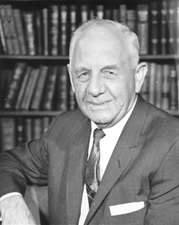Frank Carlson
Frank Carlson (born January 23, 1893 in Cloud County , Kansas , † May 30, 1987 in Concordia , Kansas) was an American politician ( Republican Party ) and from 1947 to 1950 the 30th governor of Kansas. He also represented this state in the US Senate .
Early years and political advancement
Frank Carlson graduated from Concordia Normal and Business College and Kansas State College . There he majored in agriculture. During the First World War, he served as a simple soldier in the US Army from 1918 to 1919 . After the war he returned to his hometown Concordia, where he became a farmer. Carlson was an MP in the Kansas House of Representatives from 1929 to 1933 . From 1932 to 1934 he was also party chairman of the Republicans in Kansas. Between 1935 and 1947 he represented the sixth constituency of his state as a member of the US House of Representatives . In 1946 he was elected the new governor of Kansas.
Kansas Governor
Carlson's term began on January 13, 1947. After re-election in 1948, he remained in office until November 28, 1950. During this time, the school system in Kansas was generally improved. Not only colleges and universities were funded, but also schools in rural areas. Another focus was health policy. Here, too, the rural area was given greater consideration. In this context, welfare programs have been restructured. The motorway network was expanded. For this purpose, a 20-year expansion program was decided, which was financed by an increase in the mineral oil tax. In 1950, Carlson was elected to the United States Senate. As a result, he resigned on November 28, less than two months before his term ended, to take up his new post in Washington, DC . Lieutenant Governor Frank Hagaman had to complete his remaining term of office .
Another résumé
Carlson was a member of the US Senate between 1950 and 1969. There he was a member of several committees, such as the US Senate Committee on Foreign Relations . In 1952 he supported Dwight D. Eisenhower's presidential candidacy . Frank Carlson was a member of the board of directors of World Vision United States and also a member of an evangelical network now known as The Family, and was one of the most influential people on that network in US politics.
In the 1950s he traveled together with the Senator Homer Capehart, who as a member of the Committee on Foreign Relations was, and a delegation of 12 businessmen of "The Fellowship", a part of the network of The Family , after Haiti . The aim was to establish contacts and expand the network in a country which, according to the anti-communist network, was particularly prone to a communist takeover. Impressed by the person of François Duvalier , who publicly proclaimed a Christian brotherhood, Frank Carlson campaigned effectively for the support of the ruler later known as Papa Doc on his return .
After his time in Congress ended in 1969, he retired to Concordia, where he spent the rest of his life. He died there in 1987 at the age of 94.
Individual evidence
- ^ "A Secret Weapon Arms The Christian Soldier," The Miami News, Feb.13, 1965, p. 5A
- ^ "Carlson's Role in Viet Aid Agency," The Fort Scott Tribune, Kansas, June 28, 1967
- ↑ "Records of the Fellowship Foundation - Collection 459" ( Memento of the original from January 3, 2017 in the Internet Archive ) Info: The archive link has been inserted automatically and has not yet been checked. Please check the original and archive link according to the instructions and then remove this notice. in the archives of the Billy Graham Center (accessed March 11, 2010)
- ^ Jeff Sharlet, "The Family: The Secret Fundamentalism at the Heart of American Power." New York: HarperCollins 2008, pp. 215-216, ISBN 978-0-06-055979-3
Web links
- Frank Carlson in the National Governors Association (English)
- Frank Carlson in the Biographical Directory of the United States Congress (English)
- Biography at the Kansas Historical Society (English)
- Literature by and about Frank Carlson in the bibliographic database WorldCat (English)
- Frank Carlson in the database of Find a Grave (English)
| personal data | |
|---|---|
| SURNAME | Carlson, Frank |
| BRIEF DESCRIPTION | American politician |
| DATE OF BIRTH | January 23, 1893 |
| PLACE OF BIRTH | Cloud County , Kansas |
| DATE OF DEATH | May 30, 1987 |
| Place of death | Concordia , Kansas |



